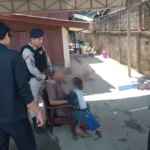CHAING RAI – Academics at Mae Fah Luang University (MFU) are worried that hundreds of thousands of rai of rice fields in Chiang Rai, which depend on the Kok River to move rice across the country, may face contamination from arsenic and other heavy metals.
Their concern follows earlier checks by the Department of Medical Sciences on off-season paddy rice harvested in May. The tests found heavy metals in the rice, but at levels still considered safe for consumption. Even so, experts warn that long-term exposure can cause these substances to build up in the body, which would put everyone at risk over time.
MFU is now pushing the government to approve a central budget of 1.2 billion baht for the Provincial Waterworks Authority (PWA). The aim is to survey and develop new raw water sources to replace the current use of the Sai River and Ruak River.
Dr Suebsakul Kijtanukor, a lecturer at the School of Social Innovation at MFU, told Prachachat Turakij that there has been no real progress in addressing arsenic and other pollutants in the Kok River. He said the situation remains unchanged, with no meaningful steps taken to deal with the problem, especially when it comes to talks with the Myanmar government.

Thai state agencies have maintained that levels of heavy metals in vegetables are still below official limits. As long as contamination does not exceed the standards, the authorities argue there is no need to declare a disaster zone or treat the issue as an environmental emergency.
For the vast rice-growing areas in Chiang Rai, which rely heavily on the Kok River and the main Sai River, relevant state bodies have not yet carried out detailed checks on heavy metal contamination in the paddies. Once rice from Chiang Rai enters the market, the impact on consumers will differ from person to person and remains unclear.
No one knows for certain where rice from these hundreds of thousands of rai ends up. The current assumption is that it is distributed nationwide. This means the entire food chain linked to rice from Chiang Rai cannot be guaranteed to be free of heavy metal contamination, which leaves consumers exposed to a degree of risk. Once the rice reaches shops and markets, everyone who eats it may be affected.
Dr Suebsakul added that provincial officials have already tested vegetables grown in Chiang Rai three times. Out of 66 samples, arsenic was detected in 17, cadmium in 54, and lead in 17. Even so, state agencies insisted that all samples remained within official limits and sent them to the Department of Medical Sciences for further analysis.
Tap water supplied by the Provincial Waterworks Authority in central Chiang Rai also raises concern. The system there uses raw water from the Kok River and serves about 41,000 people in the city. In Mae Sai district, tap water comes from the Sai River and Ruak River, and serves around 15,000 people.
Monthly checks on contaminants have found arsenic and barium in the water. The test results show that both substances are still below the legal standard, so the water is classified as safe to drink and use. However, long-term exposure may still cause these metals to accumulate in the body and raise health risks for Chiang Rai residents.
The PWA has already studied alternative water sources that could be used to produce tap water, with a planned budget of about 1.2 billion baht. This money would have to come from the central government budget.
Dr Suebsakul stressed that the government must move quickly and tackle three urgent points.
- Speed up talks with the Myanmar government, which he sees as the source of the heavy metal pollution in the rivers. The discharge of these substances into the waterways must stop.
- Halt all imports of mineral ores from Myanmar. Thailand currently imports tin, lead, wolfram, manganese, and antimony from Myanmar. These five minerals are important for energy transition industries and are imported for re-export to third countries. Stopping these imports would pressure Myanmar to treat the pollution issue more seriously.
- Approve the 1.2 billion baht budget for the Provincial Waterworks Authority in Chiang Rai so that it can shift to new raw water sources for tap water production.
He also said Chiang Rai needs an effective monitoring system for heavy metal contamination in agricultural products. Local fishers have already returned to fishing in the Kok River and the main Sai River, and fish consumption is rising again. Recent tests on river water and aquatic life found mercury, arsenic, and lead.
Government agencies maintain that these substances are still below the acceptable standard. Even if the levels meet current legal limits, these metals can still build up in the body over time. Dr Suebsakul believes the authorities are underestimating the health risks because they focus only on whether tests meet the formal standard. Ignoring long-term accumulation, he warned, will create serious challenges for future governments.















